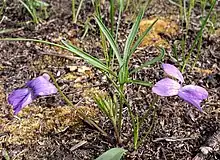Viola pedatifida
Viola pedatifida, known variously as prairie violet, crow-foot violet, larkspur violet, purple prairie violet, and coastal violet, is a perennial herbaceous plant in the Violet family (Violaceae). It is native to Canada and the United States.
| Viola pedatifida | |
|---|---|
 | |
| In Waukesha County, Wisconsin | |
| Scientific classification | |
| Kingdom: | Plantae |
| Clade: | Tracheophytes |
| Clade: | Angiosperms |
| Clade: | Eudicots |
| Clade: | Rosids |
| Order: | Malpighiales |
| Family: | Violaceae |
| Genus: | Viola |
| Species: | V. pedatifida |
| Binomial name | |
| Viola pedatifida | |
| Synonyms[1][2] | |
Taxonomy
Prairie violet was first formally named in 1831 by the Scottish botanist George Don (1798–1856). The specific epithet pedatifida means "palmately divided with cleft segments" in botanical Latin, in reference to the leaves, which look like a bird's foot with the outer toes again parted.[3][4]
It may hybridize with the common blue violet, Viola sororia.[5]
Description
Prairie violet grows 5–30 cm (2.0–11.8 in) tall with violet flowers and between 2–11 deeply divided leaves. It is an acaulescent violet, meaning it lacks leaves on the flowering stems. The leaves have 5–9 lanceolate to linear lobes, growing up to 7 cm (2.8 in) long and 8 cm (3.1 in) across. Prairie violet flowers between March and June. The flowers are light violet, the lower three petals white near the base, usually with some hairs. It forms ellipsoid capsules in the summer.[5][6]
Distribution and habitat
Viola pedatifida is native broadly across the central United States and south-central Canada, from Alberta to Ontario, south to Arkansas, west to New Mexico. It has a disjunct distribution in Virginia where it grows in Appalachian shale barrens. Across much of its range, prairie violet grows in dry prairies and other dry, sunny habitats.[5][4]
References
- "Viola pedatifida". Germplasm Resources Information Network (GRIN). Agricultural Research Service (ARS), United States Department of Agriculture (USDA). Retrieved 2010-03-12.
- Robert W. Freckmann Herbarium University of Wisconsin - Stevens Point Retrieved 2010-03-12.
- Northern Prairie Wildlife Research Center Retrieved 2010-03-12.
- Wilhelm, Gerould; Rericha, Laura (2017). Flora of the Chicago Region: A Floristic and Ecological Synthesis. Indiana Academy of Sciences.
- Little, R. J.; McKinney, L. E. (2015). "Viola pedatifida". In Flora of North America Editorial Committee (ed.). Flora of North America North of Mexico (FNA). 6. New York and Oxford. Retrieved 21 June 2020 – via eFloras.org, Missouri Botanical Garden, St. Louis, MO & Harvard University Herbaria, Cambridge, MA.
- Lady Bird Johnson Wildflower Center Retrieved 2010-03-12.